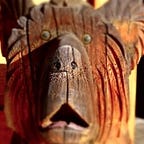Now, before we get into the details, let me just say that I have already resigned in the fight to preserve the integrity of the word itself. That is lost. But skepticism as a concept, as a mode of thought, can and must prevail. And it will. It is a natural survival technique, and perhaps our most vital weapon against the cruelty of the unknown and destroyer of the unknowable.
There are a handful of words that are roundly misused in the American vernacular. I love bantering with nerds about them, but again, they’re a lost cause. Nonplussed, peruse, prodigal, and decimate are some of my favourites. But skepticism is too important to let go entirely. Those other examples are merely qualifiers — but skepticism is a practice, a way of life.
The inspiration for this essay comes from a conversation I had the other day with a dear friend whose work is science-intensive, integrative health. He posted an article on LinkedIn that led with —
“It’s reasonable to be skeptical about having a vaccine injected into your body . . . “
And so I dropped him a note to discuss his choice of skeptical. He’s firm in his intent here, wanting readers to not be put off being called “fearful” “cynical” or “anti-science.” And he’s not wrong. In regular conversation, we all know what he’s saying. Distrusting or doubting the vaccine is natural, especially in this age of information saturation, disinformation, and outright lies. It is completely natural to feel fear, to be doubtful — to be mistrustful.
That is what the word skepticism has come to mean. But that’s not what skepticism is. That type of distrust or doubt is a negative bias — true skepticism has no biases.
True skepticism is a state of wonder. And in order to tip towards a bias, one leaves the region of skepticism and enters pessimism, optimism, or in the case of the vaccine — cynicism. They’re not mistrustful of the vaccine per se, they doubt their sources of information are valid, and so they take no action.
Skepticism is the foundation of science. It is the coming up with questions (wonder) to discover how and why the Universe functions in the way that it does. From these wonder-full hypotheses emerge experiments, and from those experiments proofs and failures. As the evidence mounts, the scientists begin to define the true and the false components, and thus knowledge. In the purest abstract sense, skepticism is a reconnaissance mission. The facts returned to us are what we use to survive and thrive in a mysterious universe. In this way, there will always be humans who occupy the state of grace that is skepticism, moving ever closer to a society whose citizens are protected by Truth, free from the dysfunction of a cynical world.
TKO 3.27.2021
